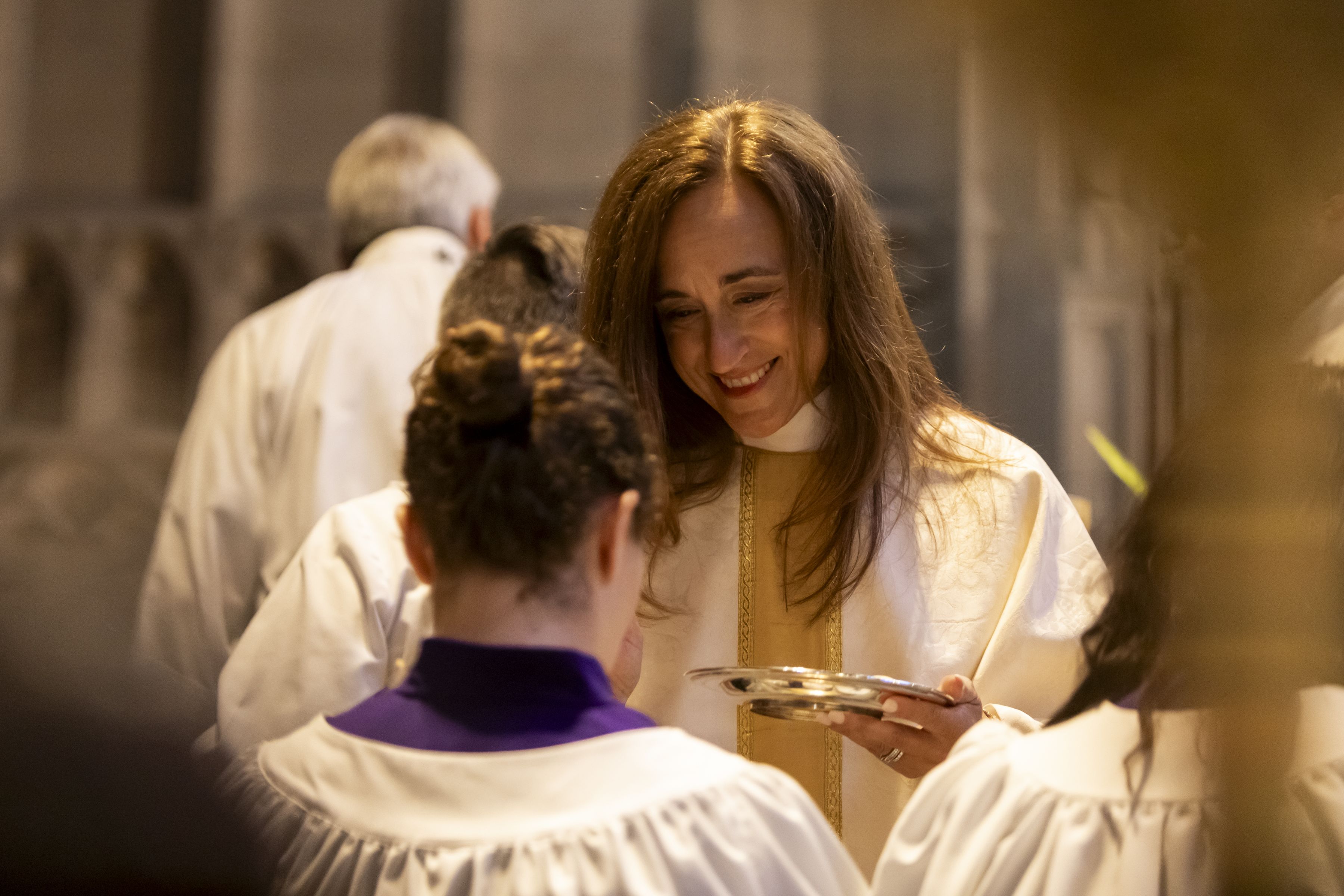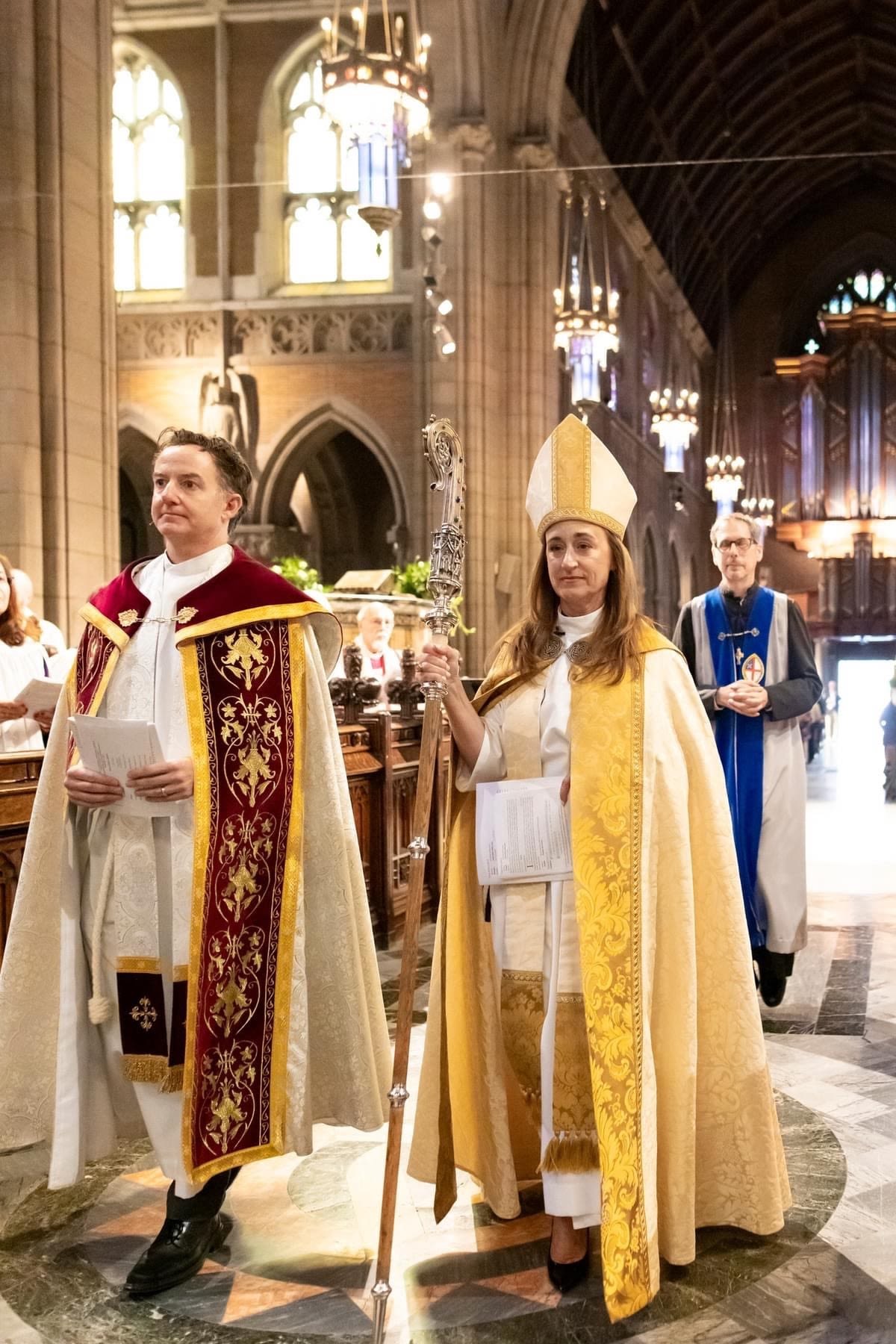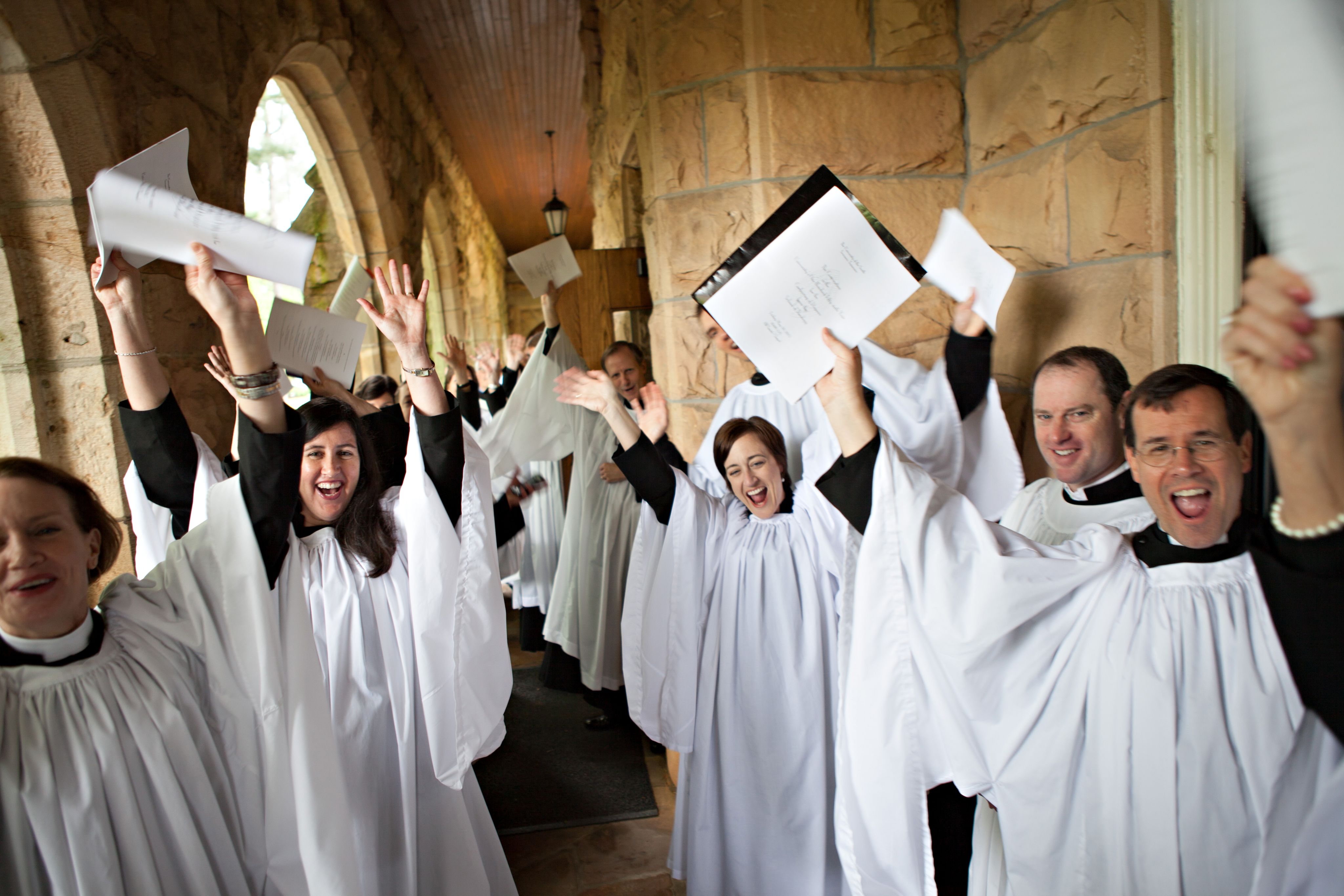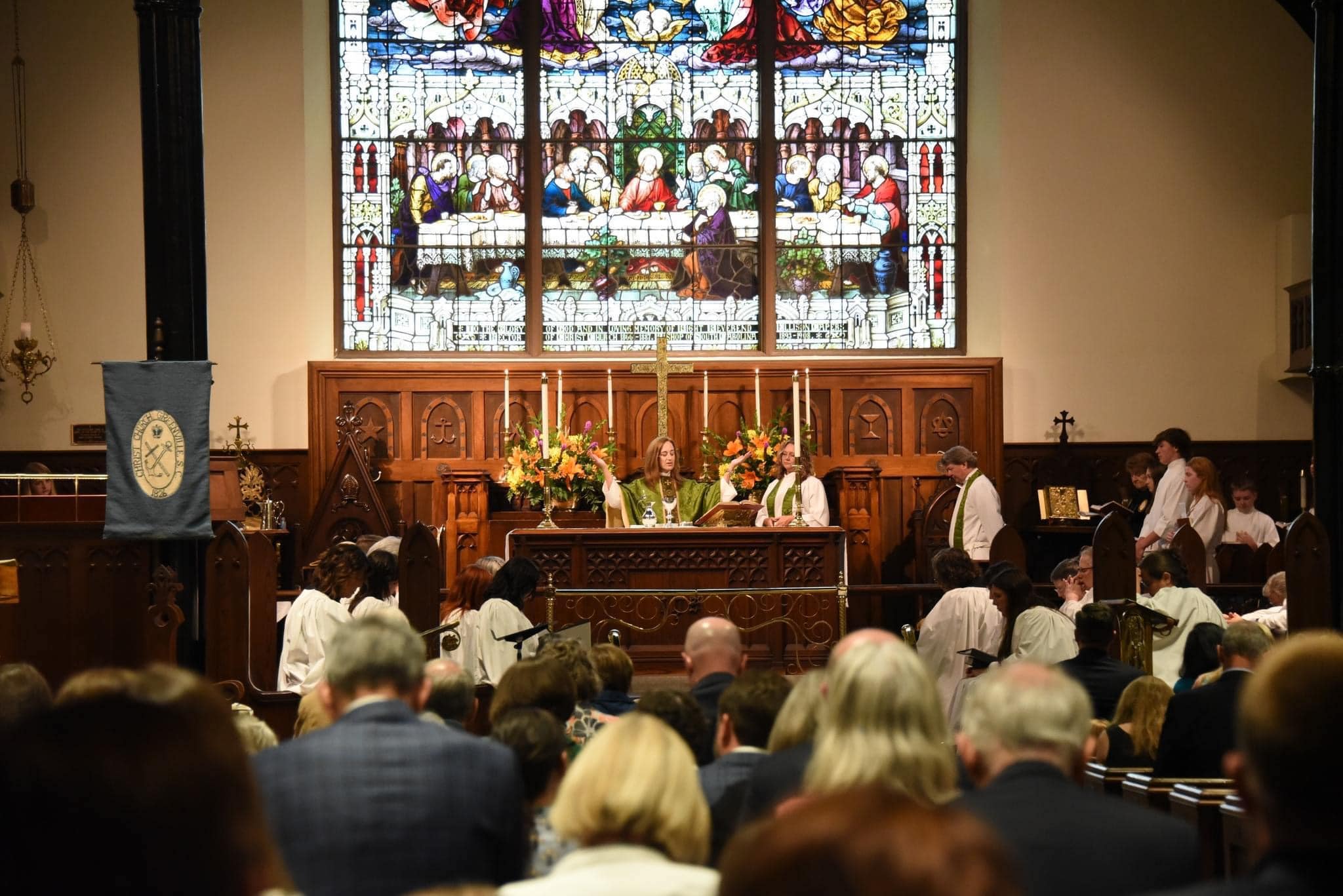Bishop Anne Jolly on Trying, Failing, and the God Who Says Go

The Rt. Rev. Anne B. Jolly, T’13, is the first female bishop to serve the Episcopal Diocese of Ohio. She was ordained as bishop coadjutor in April 2023, and took the office of diocesan bishop when the Rt. Rev. Mark Hollingsworth retired in July 2023.
As for being the first woman bishop in Ohio, she says, “Thanks be to God for the Philadelphia Eleven! I am very thankful for all the women who paved the way to make it easier for women today. As a woman, I have certainly experienced being treated differently, but that is in the back of my head instead of the first thing I think of.”
Jolly says it helped that the entire slate of candidates for bishop of Ohio was female. “The next bishop of Ohio was going to be a woman. That made it easier for me to walk in the door and do that work.” Women have served as bishops since 1989, and Katharine Jefferts Schori became the church's first female presiding bishop in 2006. Of the church’s approximately 280 active and retired bishops, 46 are women.*
In many places, though, the sight of a woman in a clerical shirt is still new and tremendously meaningful—even more so to see a woman in a purple clerical shirt. “I’ve had some women come to me in tears,” she says, “older women especially, who could not serve at the altar because it was only open to boys. All their lives they were told to serve on the altar guild.”
Jolly is also excited about the increasing diversity in the Episcopal Church’s leadership, not only for women but for all. Since 2015, dioceses have increasingly elected women, people of color, and LGBTQ+ bishops.* “We benefit as a church, as a people, by having more diverse viewpoints,” Jolly says.

Bishop Jolly pictured during her seating in September 2023 at Trinity Cathedral Episcopal Church in Cleveland, Ohio.
Bishop Jolly pictured during her seating in September 2023 at Trinity Cathedral Episcopal Church in Cleveland, Ohio.
Following her graduation from the School of Theology, with a master of divinity degree, Jolly served at Christ Church Episcopal in Greenville, South Carolina; St. Paul’s Episcopal Church in Chattanooga, Tennessee; Good Shepherd in Austin, Texas; and St. Gregory’s Episcopal Church in Deerfield, Illinois.
In 2019 she became president of the Standing Committee of the Diocese of Chicago searching for the next bishop following Bishop Jeffrey Lee’s retirement in 2020. During the interim, and after Paula Clark was elected to succeed Lee, she and the Standing Committee became the ecclesiastical authority for the diocese when Clark suffered a stroke in April 2021, days before her scheduled consecration. Throughout Clark’s recovery, Jolly was committed to “holding down the fort” until Clark recovered and eventually was consecrated in September 2022.
The Gift of Seminary
While in seminary, candidates are often asked, “What do you see yourself doing in your ministry?” As a student, Jolly wasn’t able to answer this question specifically, but now reflects on her skill set and what the office of bishop demands. “When I think about the way my brain was made, I always think about big systems and seek creative solutions for the bigger picture,” she says. “That is the primary role of the bishop’s office, to be able to both see and facilitate growth in the system. It’s a ligamental ministry, joining the parts of the Body of Christ.”
As for dealing with the demands of the office, Jolly’s seminary classmate Colin Mathewson, T’13, co-rector of St. Luke’s Church, San Diego shares, “Anne combines a ready smile and can-do spirit with technical know-how, gifts for vision-casting, and strategy development. I am not surprised at all that she’s been elected bishop!”
Thinking back to her time at the School of Theology, Jolly says, “The beautiful gift of seminary was that I graduated with a strong understanding of our church’s polity, how our theology forms who we are, and how our liturgy informs our theology. As a bishop, I don’t know how I could do this job without understanding that the commonality between our polity, liturgy, and theology is the glue that holds us together.”
Having been grounded in Episcopal tradition allows Jolly to be endlessly creative. “I am grateful for the seminary’s deep formation in those areas,” she says. “It allows me to be thoughtful, because everything we do in liturgy, or within our polity, or in our theological moves, has ramifications. That’s why we care about theological education. We educate people to go educate people.”
“The other gift of seminary—residential seminary, in particular—is the gift of learning to live in community,” Jolly says. “Whether we like each other or not, whether we have anything in common or not, the intentionality of being with people, committing to time with them, and committing to engage with them—that’s what church is. I feel more equipped to deal with the huge challenges and help heal divisions that can happen in congregational life.”
Dealing with those challenges comes easy for Jolly, according to the Rev. Dr. Jessica Babcock, T’13, T’21, rector of St. Mark’s Episcopal Church, Marco Island. “Anne was always positive, always joyful. She met everyone in the classroom with a smile. Her skill at relationship building was evident then and will serve her well as bishop.”
Michelle Fritch, T’12, associate rector of St. David’s in Roswell, Georgia, shares this, “Anne and I were the only M.Div. students with a working spouse and three school-aged kids that I was aware of in our class. A woman who can get through seminary while raising children can do anything!”

Anne Jolly pictured at the School of Theology with her graduating class in May 2013.
Anne Jolly pictured at the School of Theology with her graduating class in May 2013.
About Jolly the dean of the School of Theology, the Very Rev. James F. Turrell shares, “Bishop Anne was a remarkable student and leader in the seminary community, and I am overjoyed that God has called her to serve as bishop. I have a picture in my office of Anne running alongside her classmate, the Rev. Candice Frazer, crossing the finish line of a half-marathon while studying notes for a liturgy exam, with a smile on her face. Somehow that encapsulates so much of her spirit: hard work, dedication, careful thought, and a sense of humor. She will be a blessing to the diocese of Ohio, as she has been a blessing to so many before.”
Jolly’s time at seminary provided the foundation upon which she has solidly built. When asked if she has advice for today’s seminarians, Jolly says “Ask a lot of questions. How can I use my theology to inform how the church can be different in the world? Push for those conversations, because that’s all you’re going to be able to think about when you’re here.”
A Church on the Go
Jolly also credits her time as a trainer with the College of Congregational Development, a program of the Diocese of Olympia, with providing the tools to develop churches that are faithful, healthy, and sustainable. She says healthy churches need to have hard conversations before reaching the tipping point where fear overtakes creativity. However, many churches shy away from these conversations and cling to the familiar, traditional model of church, because it has worked thus far in their context.
“Jesus never says build and bring them, he says ‘Go out to the world,’” says Jolly. “He never says people in pews, dollars in plates. It’s really easy for us to forget that mission because our buildings are gorgeous and our liturgy is beautiful. Our structure reminds us that we are the Body of Christ. But I think, because we have so much that is wonderful about our tradition, we can wind up worshiping our church—either the building, or the liturgy, or the parish itself—and not Jesus, who always tells us to ‘Go forth.”’

Bishop Anne Jolly at Christ Church Episcopal in Greenville, South Carolina.
Bishop Anne Jolly at Christ Church Episcopal in Greenville, South Carolina.
The data concerning church membership is not encouraging. The Episcopal Church has lost 326 congregations over the last 10 years, dropping from 7,115 in 2013 to 6,789 in 2022, the last year of full parochial report data. In that time, the denomination has shed more than 420,000 members, down from just over 2 million. Sunday attendance also has steadily declined.**
In the face of these shifts, Jolly encourages all church leaders to name their fears, and to refuse to make decisions based on those fears. “The way the church is rolling, with the average church significantly under 100 on a Sunday and declining, so many of our churches are at the point where the amygdala is triggered,” says Jolly. “On Maslow’s hierarchy, they are angsty about survival. They physically cannot be creative because they are in fear mode.”
When faced with the data on church decline, Jolly is unfazed. “We worship a God of death and resurrection,” she says. “So why are we so afraid of dying? I’d much rather be talking about how we are using our polity, liturgy, and tradition to be something different in a world that is desperately in need. People are unrooted, unmoored, and solo. You’ve seen the loneliness studies; they’re astronomical. Our polity enacts the truth that God is community, in a society where loneliness is an epidemic.”
The most basic of human needs include finding purpose, meaning, and community, and those needs have historically been met through traditional religious practices and structure. Data supports that younger generations are increasingly exploring spirituality outside traditional means. Jolly reflects on what this shift means for today’s traditional method of “doing church.” “Try, try, try, try; fail gloriously”, she says. “I want us to put as much money and human resources as we can into being creative and failing, over and over again. In the Diocese of Ohio, we say ‘Love God. Love your neighbor. Change the world®.’”
